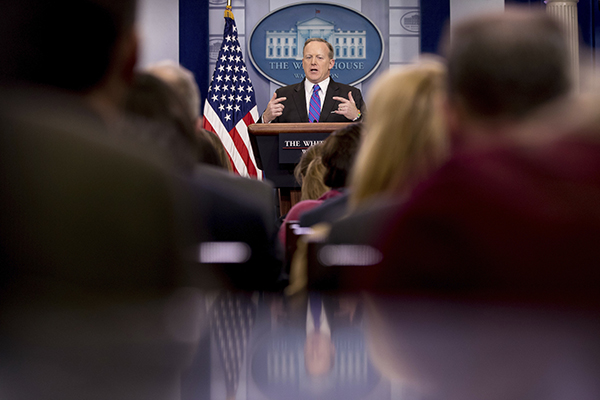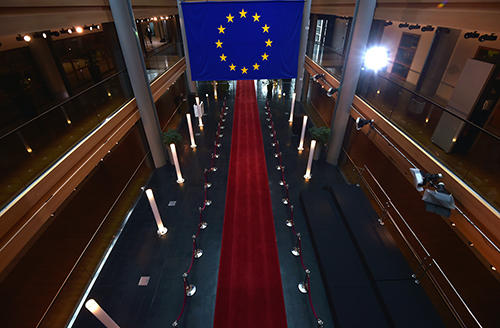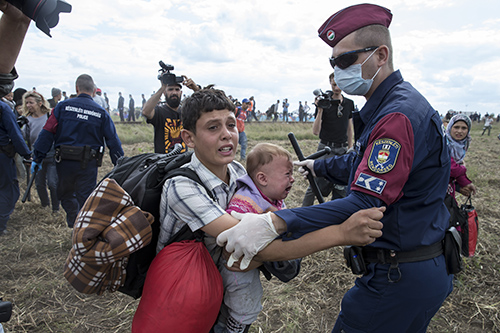
Proposed German legislation threatens broad internet censorship
The German cabinet on April 5 approved a “Draft Law to Improve Law Enforcement in Social Networks” (Netzwerkdurchsetzungsgesetz), ostensibly aimed at combatting disinformation and hate speech, that raises concerns about restrictions on free expression and the privatization of censorship. The law would compel social media companies to remove content or risk fines as high as…

Deciding who decides which news is fake
Authorities decry the proliferation of misinformation and propaganda on the internet, and technology companies are wrestling with various measures to combat fake news. But addressing the problem without infringing on the right to free expression and the free flow of information is extremely thorny.
CPJ asks German Chancellor Merkel to raise press freedom on Turkey visit
Ahead of her visit to Turkey, the Committee to Protect Journalists requests German Chancellor Angela Merkel to ask Turkish President Recep Tayyip Erdoğan to free the dozens of journalists imprisoned in the country and to urge him to allow the more than 100 media outlets closed since failed July 2016 military coup to reopen and to operate without harassment.
CPJ calls on Merkel to use Kyrgyzstan visit to secure Askarov’s release
CPJ calls on German Chancellor Angela Merkel to use her upcoming visit to Kyrgyzstan to call on officials there to release the imprisoned journalist and human rights defender Azimjon Askarov. The U.N. Human Rights Committee found in April 2016 that Kyrgyzstan is obligated to free Askarov, quash his conviction, and pay him compensation for unjust imprisonment. Chancellor Merkel is scheduled to visit Kyrgyzstan on July 13 and 14.

EU rulings on whistleblowers and right-to-be-forgotten laws puts press freedom at risk
European journalists were reminded today that their freedom to report is not only determined by national laws, but increasingly by European institutions. Today, after years of political battle, the European Parliament adopted the Passenger Name Record directive, the Data Protection Package, and the Trade Secrets Protection Act. The stakes were immense and the debates long…

Journalists not welcome: Across Europe, press and migrants increasingly barred
“The press is not allowed in refugee centers.” The message from the Greek government could not have been clearer. “No permission will be given to television crews and reporters to enter such premises that hosts refugees,” Yannis Mouzalas, the minister in charge of immigration policy, said in a February 29 statement. In protest the Pan-Hellenic…
Balancing Act
Press freedom at risk as EU struggles to match action with values The European Union strives to be a global leader in press freedom but faces challenges from member states that have criminal defamation and blasphemy laws, and have introduced counterterrorism measures, including mass surveillance. The EU has made press freedom imperative in negotiating with…
Balancing Act
About this report The report examines how the European Union upholds its commitment to press freedom in its interaction with member states, international bodies, and strategic partners. It examines the impact that repressive legislation in member states has on journalists, how calls for wider surveillance and governance in the wake of recent terror attacks risks…
Balancing Act
Summary The European Union describes itself as a model for press freedom and an exemplary global power. Although many of its 28 member states feature at the top of international press freedom rankings, there are significant challenges that undermine press freedom and new threats are emerging.
Balancing Act
The EU and press freedom “The European Union should…” Nearly every day this remark is on the lips of press freedom activists who blame the EU for not doing enough for press freedom. “The EU should call Hungary to order.” “The EU should slam Russia for its repression of the independent media.” “The EU should punish…